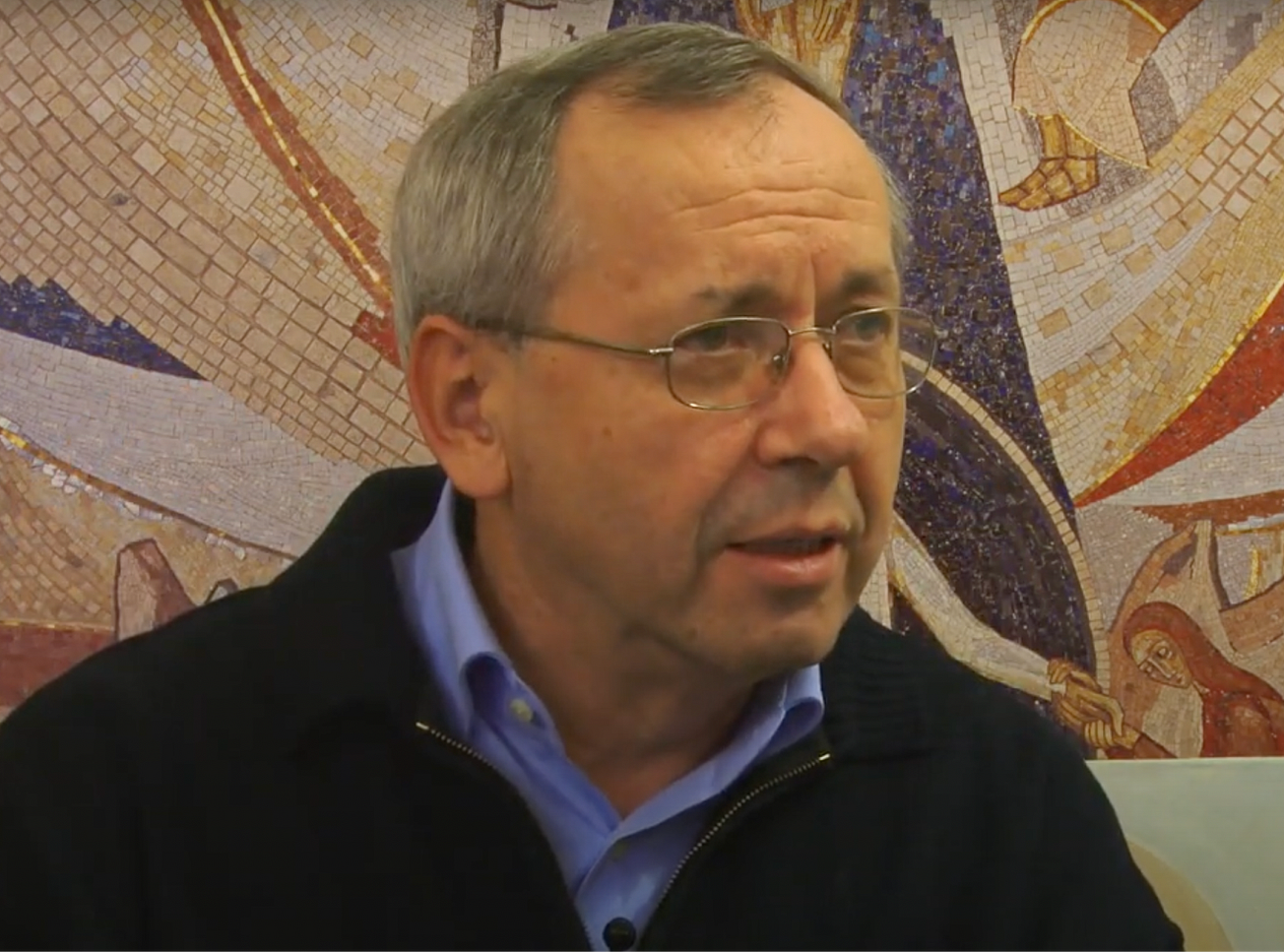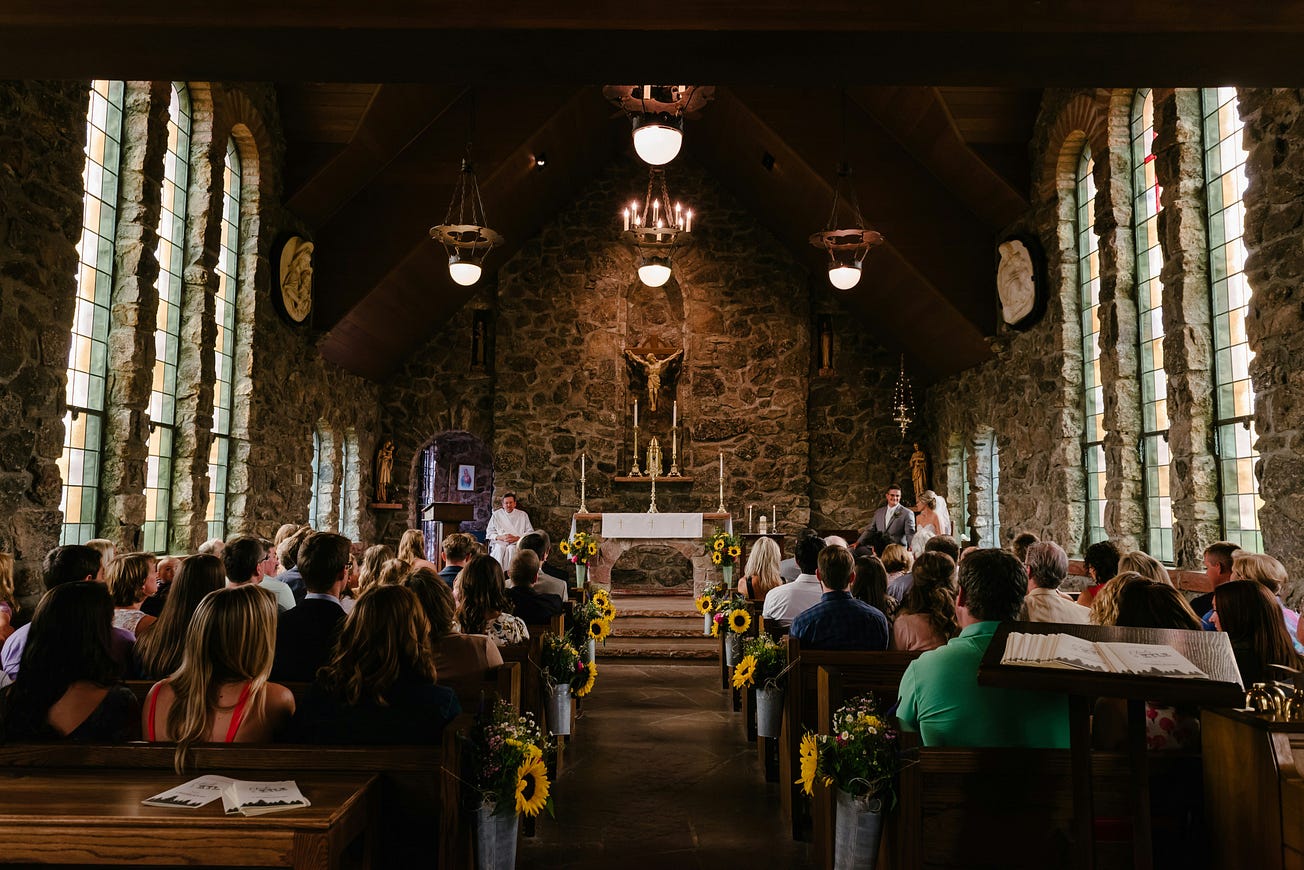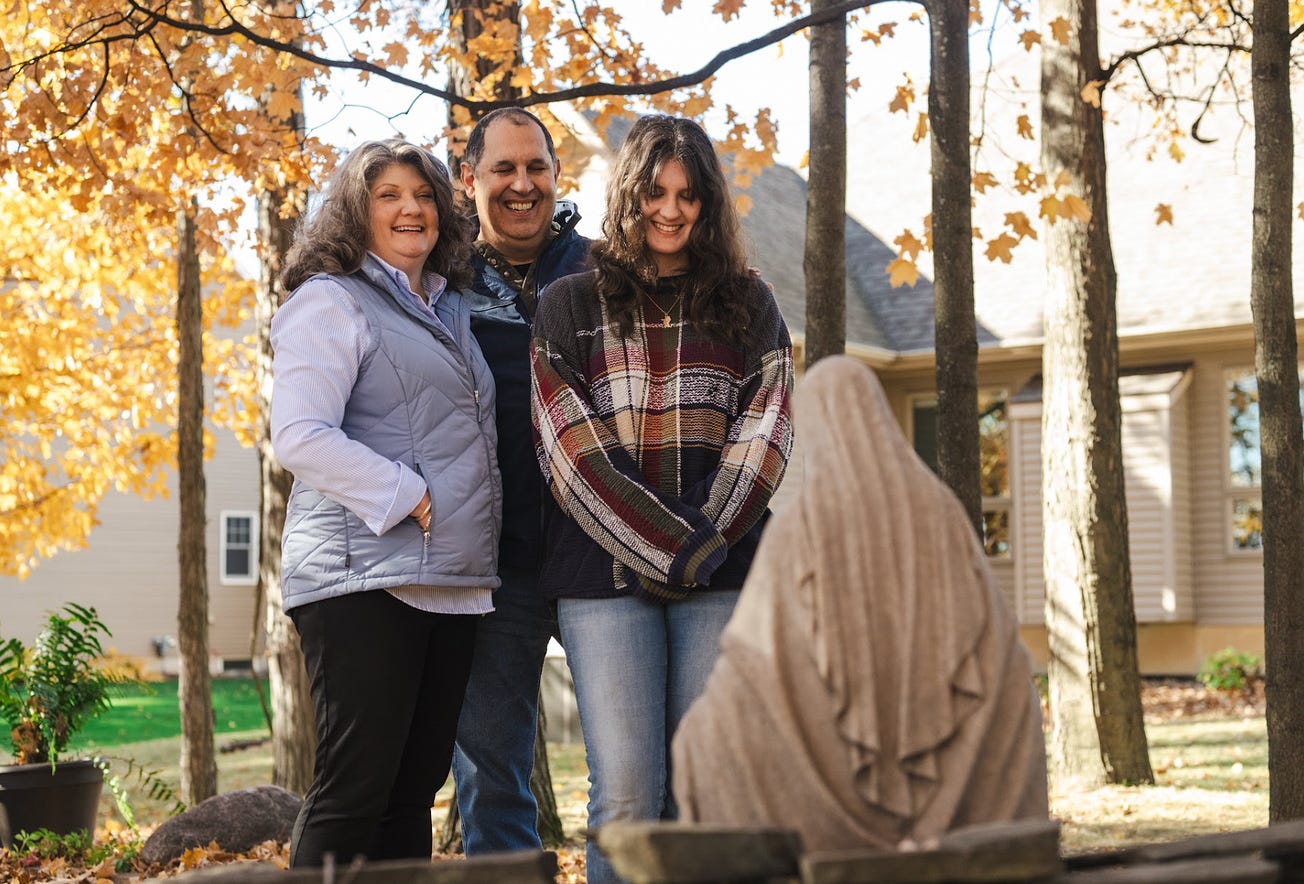Happy Friday friends,
I’m not in Rome right now, as I had intended to be. I was booked and expecting to be there from earlier this week, ready to cover a legal hearing in the Vatican on Wednesday in addition to the synod. And I had a full schedule of people I wanted to see, together with JD, for the next week and a half.
Instead, I am still stateside.
On very (very) last-minute notice, my wife and I were offered a chance to participate in a weekend retreat, followed by several evenings of catechesis, as part of a continuing faith formation program we’re both involved with.
It’s a retreat we’ve been hoping to go on for some time, several years in fact, but nothing ever opened up.
For both of us, we’ve been hoping this particular retreat opportunity would come along, since it’s something we’ve recognized we need for the spiritual health of our marriage.
You may not know this about me, but I can be a little hyper-focused on work.
But now the chance to make this retreat has come along, and it couldn’t be worse timing for The Pillar.
I was mentally packed for Rome, there are financial trial hearings I wanted to attend, and at least one of the meetings I had planned there was months, if not years, in setting up. There’s also this synod going on in the background.
My knee-jerk reaction was to simply go to Rome as planned. I have a job to do, after all. It’s a job I happen to love, and which I am very lucky to have at all.
But my wife strongly encouraged me to think and pray about it, about how things are with us, and have been since the birth of our daughter, and all the ways I’ve said I need to mature spiritually into fatherhood. So I did.
And I came to see this was, of course, more than a scheduling conflict I was being presented with.
In previous jobs (and careers), I have always been clear with myself and my employers that my faith comes first. It’s my faith that sustains my marriage, patterns my fatherhood and (I hope) informs how I conduct every other part of my life.
When faced with similar choices in the past, when something I considered important to my formation or spiritual life conflicted with work, I’ve never had a problem saying simply and clearly to my bosses that prayer is a non-negotiable for me, even offering to quit, if that’s what it came to.
Don’t get me wrong, I was a childless guy in my 20s and 30s back then, so the stakes were relatively lower than for a married father in his 40s, but I’d like to think I’d do the same today.
I don’t have a boss these days, and I no longer work in politics, or in any of the other fields where I used to toil.
I work in and around the Church. And in JD I’m lucky to have a partner who's probably more serious about the interior life than me. But, strangely, that didn’t make my decision this week any more intuitive.
On the contrary, I found it very easy to argue with myself that going to Rome, doing the things I had planned, covering the synod and much else more important, mattered in a way other jobs I’ve had didn’t — that this work is an important part of my faith and life in the Church.
That’s a slippery slope of thought.
For sure, we see our work at The Pillar as a service to the Church, and as an apostolate. It’s something I pray about daily, and it informs how we approach any story, no matter how serious or lighthearted.
It’s a blessing to work where I do, where my faith doesn’t overlap with my day job — my faith underpins it.
But I could easily confuse doing my job with cultivating my faith. They are not the same thing. In fact, covering difficult and controversial stories about the life of the Church requires that we prioritize the spiritual life.
That’s not a trite piety. Sin and scandal are an inevitable reality in the Church, which is human as well as divine. But the horrors of the sexual abuse crisis, the relentless charlatanry of financial crime, and the constant petty vanities of episcopal politics can make a person cynical about the Church and her ministers, especially if you spend time sifting through them every day.
If one doesn’t — if I don’t — make a conscious effort to keep myself grounded in the sacramental life and in prayer, I can all too easily take a jaundiced view of them, too.
Certainly, better men than me have lost their faith in the business of the Church.
So I realized this week I had some simple questions to answer: What is my primary point of contact with God and his Church - my work, or my spiritual and family life?
Am I first a sinner seeking salvation, or first a professional Catholic working the beat?
And isn’t the call to put the pursuit of holiness ahead of the business of the Church the whole point of a project like The Pillar?
Framed like that, my choice this week became much clearer. And that’s why I’m on retreat today, not in Rome.
As all this played out, I’m lucky that I have a wife who patiently waited for me to discern for myself, and didn’t throw things at my head to accelerate my arrival at the right conclusion.
I’m equally lucky that in JD I have a partner to whom the situation was equally clear, and who has been supportive of me choosing my personal faith life over my public work commitments this week — however last-minute the decision.
But most of all, I am grateful for our subscribers who put me in a position to make a discernment like this at all.
And for those of you who are readers but aren’t paying subscribers, I’d like to say this: Paying for the news you get from The Pillar is a choice. It’s a choice to support credible, well-sourced, independent news covering everything that is happening in the Church.
I think supporting that work is important, and I hope you do too.
But it is also a choice to support Catholic journalists who want to be Catholics first.
We take our faith seriously because, in the end, it’s the only way we know we can take our work seriously. That’s not a priority many media companies have, and not a luxury most journalists can afford. I hope you’ll consider joining us.
I do still feel like I’ve left JD alone in the breach this week, though. And I am conscious that many of you were expecting me to be in Rome, and might be more than a little let down by my change of plans. For that, I’m sorry.
But thank you guys for understanding, and for supporting us. I mean it.
OK, here’s the news.
The News
It has been an especially grim week for Christians in Nigeria.
Across Nigeria, the kidnapping of clerics is on the rise — 30 priests were kidnapped in Nigeria in 2022, while at least 40 were killed in the same year, according to out local man on the ground. I’m not sure I can fully comprehend those numbers.
But, horrific as it is to contemplate, this only got worse.
On the same day, in a separate attack, at least five people were killed.
Eyewitnesses told The Pillar that assailants stormed the Anyiin-Ayilamo village in the community of Mahanga. They shot two locals before moving to Ayilamo in Tombo ward, where they killed three additional people and injured three others.
Anywhere else in the world, three religious being kidnapped and five people being murdered in two separate attacks in 24 hours would be a crisis to shake the local Christian world. In Nigeria, it’s Tuesday.
Please pray for the Christians of that land, and please do not look away from what they are living through — because many of them are not living through it.
—
Cardinal Pierbattista Pizzaballa, the Latin Patriarch of Jerusalem, made headlines this week when he offered himself to take the place of Israeli hostages being held in Gaza.
The cardinal only got his red hat last month, but he’s quickly found himself in the middle of the largest conflict and geopolitical crisis on the map. And, as Luke Coppen wrote in an analysis this week, he’s already become arguably one of the world’s most prominent cardinals.
—
Speaking of cardinals, another man in red who has found himself in the spotlight this week, albeit in a very different context, is the Vatican Secretary of State Cardinal Pietro Parolin.
Given his default setting of studied diplomatic reserve, it is indeed a surprise to see Parolin come out swinging for fidelity to divine revelation, as interpreted by the Church’s Magisterium.
So, JD asks, is Parolin emerging (or remerging) as a possible future pope? Very maybe.
It’s worth noting, as JD does, that Parolin has seen himself largely sidelined from several parts of his day job — in theory, the biggest in the Church after the pope’s. Francis has effectively outsourced the top shelf of papal diplomatic projects to his close collaborator, Cardinal Matteo Zuppi, and the fallout of the financial trial has seen the Secretariat of State shorn of much of its previous heft in Vatican domestic affairs.
Does this leave Parolin feeling isolated, or perhaps even liberated to start speaking his mind more? It’s certainly possible, though as a conclave candidate, he still carries some serious baggage along with the weight of his office.
One thing I would underline, though, is this: Whenever the next conclave happens, the Italian bloc will be proportionally smaller than since I don’t know when in history, but I think it will paradoxically be more influential than ever.
The other side of the coin of all these “peripheral” appointments made by Pope Francis in recent years is that the College of Cardinals is now largely a group of strangers. The Italian contingent, which carries a lot of Europe in its wake, knows itself well, and thanks to cardinals like Parolin, Zuppi, and papal vicar Angelo De Donatis, they are also known worldwide.
All this matters when you’re considering what happens next.
Why is the University of Dallas consistently ranked one of the happiest campuses in America? One reason is our nationally recognized Core Curriculum. The Core doesn’t lock young graduates into an industry; instead, it sets them on a search for meaning through the sciences, the arts and the great works of Western civilization to prepare them for a life well-lived. Find out more at udallas.edu/pillar.
The Vatican court hearing the lawsuit of former Auditor General Libero Milone met for its final session this week, and something interesting happened.
But here’s the important thing: In defending itself from Milone’s argument that the Secretariat of State is liable for his wrongful termination, the Vatican department argued it had a very narrow relationship with Milone’s old office. Specifically that of “the relationship between the ‘entity that provides to the audit of the financial statements’ (the Auditor) and the ‘entity subject to audit’ (the Secretariat of State).”
This is a big deal, because over in the other Vatican financial trial, the secretariat’s former sostituto, Pillar reader Cardinal Angelo Becciu, has been arguing the exact opposite — that the auditor’s office had no authority to examine the slate of weird and wonderful investments for which he is now on trial.
If you’re following the financial scandal even a little, this is a story that matters. I promise.
Since publication, Cardinal Becciu’s press office (he has his own press office) have been in touch to say that Pope Francis fired Milone, not him — the cardinal was just the messenger.
That’s certainly something he’s said before, and as we’ve noted in our previous coverage it presents some interesting questions.
The good cardinal, Pillar reader that he is, also said (and I am paraphrasing here) the Secretariat of State was definitely, definitely outside of Milone’s jurisdiction, the same department’s own legal arguments this week notwithstanding. And he wanted to say that it was Parolin who blocked an audit of secretariat finances, not him.
Becciu also said that “insinuating” that either Milone’s firing or the false criminal accusations against Cardinal George Pell were his doing is “liable to lawsuit”.
Of course, no one is “insinuating” Becciu fired Milone, Milone is alleging it directly in open court. In a lawsuit.
As for blaming Becciu for ginning up spurious criminal accusations against the late Cardinal Pell, we wrote no such thing, so I’m not sure why he felt the need to say that.
But just for everyone’s peace of mind, rest assured Cardinal Becciu has our lawyer’s number, should he wish to get in touch.
In all other events, we remain eager to interview him.
—
Meanwhile, in Germany, the German Catholic Church’s official news portal Thursday voiced a suspicion that the Vatican is deliberately slow-walking appointments to the country’s vacant dioceses as some kind of punishment for the synodal way.
Tobias Glenz, an editor at katholisch.de, wrote that every day he and his colleagues were on the lookout for a new German episcopal appointment, but none seemed to be coming, despite roughly 10% of German sees being vacant.
“What is Pope Francis waiting for?” Glenza asked. “Does he even have something against the Church in Germany?”
So are the Germans in the Vatican’s naughty corner? Or are they actually just waiting in the same line as everyone else, and used to a better class of service?
Read the whole thing to find out.
Nothing is simple
In and among the confidential sessions and daily press briefings, perhaps the most interesting thing about the ongoing synodal sessions this week is who is not there.
The two bishop delegates from China left early this week, stepping out with the nearly month-long meeting only half complete. Their early departure was widely noticed, especially because of the fanfare that greeted their arrival earlier this month.
Officially, Bishop Anthony Yao Shun and Bishop Joseph Yang Yongqiang left because of some urgent “pastoral needs” in their respective dioceses, though their premature exit mirrors what happened in 2018, at the synod on young people, when the two Chinese bishops at that synod also left halfway through.
Despite some reflexive skepticism I have seen, I don’t think it’s fair to paint either Yao or Yang as CCP bagmen. Their personal histories suggest that a far more nuanced assessment would be more fair.
I also ran through the likely reasons for their early departure, taking as granted that the urgent “pastoral needs” cited were so many diplomatic niceties. If Yang and Yao were going home early, it seemed like a message was being sent. But by whom and to whom?
You can read the analysis here, but shortly after we published it, some friends in China got in touch to tell us what actually happened — and hard news is always better than analysis.
That decision, one rather well-placed friend told us, was a way of the CCP “demonstrating — to the Vatican, in the first instance — that [the bishops] attend at the pleasure of the Chinese state: That China and not the Vatican is in charge.”
But wait, there’s more! It turns out the bishops themselves sent a message back to Beijing with their visit, choosing to overstay their 10-day pass by remaining in Rome and at the synod for an extra two days. It’s a decision one friend in China described as “bold,” putting it mildly.
Another senior cleric in China made this observation about Yang and Yao’s synodal stay, and the reactions to their departure:
“I think a lot of people make the assumption that the Church in China is black and white. There are ‘good’ underground Catholics and bishops, and then there are government cooperators who are ‘bad’. Nothing is that simple.”
Nothing, indeed, is that simple. The whole story is a lesson in the layers that sit behind everything going on with the Church in China, and we often only see the surface.
Diminishing returns
I read this week with concern that the Japanese Sumo Association is lowering its minimum weight and height requirements for aspiring competitors in the sport.
It’s a change that alarms me.
I am, I like to think, a man of many private passions. And one of them is sumo. I’m serious.
Last week I mentioned in passing that several decades ago I spent time living in Israel, at a seminary/retreat house, and it was there that I first spent any real time watching sumo.
Free time was short, and competition for the only TV was fierce.
The house had exactly two (2) VHS films: the animated classic “Prince of Egypt,” in Italian, and a Brad Pitt vehicle for romanticizing IRA terrorism called “The Devil’s Own,” dubbed into Hebrew.
Apart from the standard slate of Israeli TV stations, all of which were incomprehensible to us, the only channel on offer was Eurosport.
Italian and Spanish football matches had a near monopoly on the screen, but in the off-hours of Thursday nights, there was a 90-minute slot when the other guys played an impenetrable card game called scopa, which I quickly understood was a complicated group con meant to fleece me, the only Anglo in the place. So, instead of playing, I took to watching the weekly sumo show instead.
I watched first in protest, though I soon became fascinated.
You might think that there’s something inherently comical about a sport consisting only, to the untrained eye, of two large men in loincloths slapping and shoving each other in a dirt ring. But it’s actually deadly serious, and strangely beautiful.
Watch a succession of bouts at a sumo tournament some time, as I did, and if you’re anything like me you’ll start off amused, then frustrated at the seemingly endless preamble to each match.
At the top level, the competitors spend four preliminary minutes going through a series of choreographed warm-ups in the ring before actually getting down to it, for a match that usually lasts a few seconds.
It’s the ceremony of the preambles, though, which draws you in, eventually, and in which the richness of sumo lies.
You soon realize every single part of sumo is an elaborate and excruciatingly precise ritual, one which takes over the whole of the participants’ lives, rooted in more than a thousand years of history, Shinto spirituality, and the samurai warrior code.
And, to be absolutely clear, I barely understand any of it. It’s still compelling as hell to watch though.
These guys start their training young, as teenagers mostly, moving away from home and into a “stable,” a combination dormitory and training center that is basically sumo seminary under the absolute tutelage of the stablemaster and trainer, usually a retired wrestler himself. What they eat, where they sleep, even their ring name and haircut — everything, is dictated by their trainer and by custom.
And boy is there a lot of training.
They might be big as houses, but sumos are limber to a degree I have never been in my entire life — imagine weighing north of 250 or 300 lbs and being able to drop into the splits. And size isn’t everything; in fact, there are no weight classes within the sport.
There are no fewer than 82 recognized grappling and throwing techniques to be mastered and brought to bear, and it’s not unknown for a wrestler to square off against an opponent who has up to 100 lbs on him — and to win.
As a sumo progresses up through the ranks, he has to conform to strict traditional dress codes, meaning he must appear at all times in a formal robe and wooden platform sandals, even if he’s just out for a beer and a burger.
Actually, sumo cooking is called chanko, it’s a kind of “whole farm” meat fest followed by starches, all cooked in a common pot of oil on the table. Lots of retired wrestlers open chanko joints, and hanging out in one on game day is a life goal for me.
Anyway, from where I sit, watching the sport from afar, the literal shrinking of sumo signals the decline of a civilization in just the same way as the universalization of designated hitter rule: it's a society watching its own history wither in front of itself.
Not long ago, competition to get in was so fierce that the Japanese Sumo Association had to pass special rules to check for and disqualify guys who had cosmetic surgery to make themselves bigger and taller to get in. But the well of potential talent is running dry — only 34 joined a stable last spring.
Why is it happening? Some have blamed a succession of match-fixing scandals, but this seems unlikely to be the whole story, since the sport remains widely popular in Japan. As likely, at least according to The Times, is the problem of demographics.
Japan’s population is in the process of falling off a cliff, declining by 2 million people since 2008 and children barely make up 10% of the population. Even with an influx of international competitors in recent years, it seems those numbers simply can’t produce enough of the few, the big, and the brave, needed to sustain sumo.
If the sport enters terminal decline, slipping from a national cultural icon to a mere arcane hobby, something totally unique will be lost to Japan. “Sport” really isn’t even the right term for sumo. It’s more like a cultural liturgy — the actual contests are a small fraction of what goes on, or what makes it important.
We are witnessing in Japan a grim turn in the wheel of history. A society millennia old has, in the space of a few decades, found it is now too demographically reduced to animate its own defining traditions.
Maybe I’m making too much of this. But it seems like a big deal to me.
See you next week,
Ed. Condon
Editor
The Pillar






